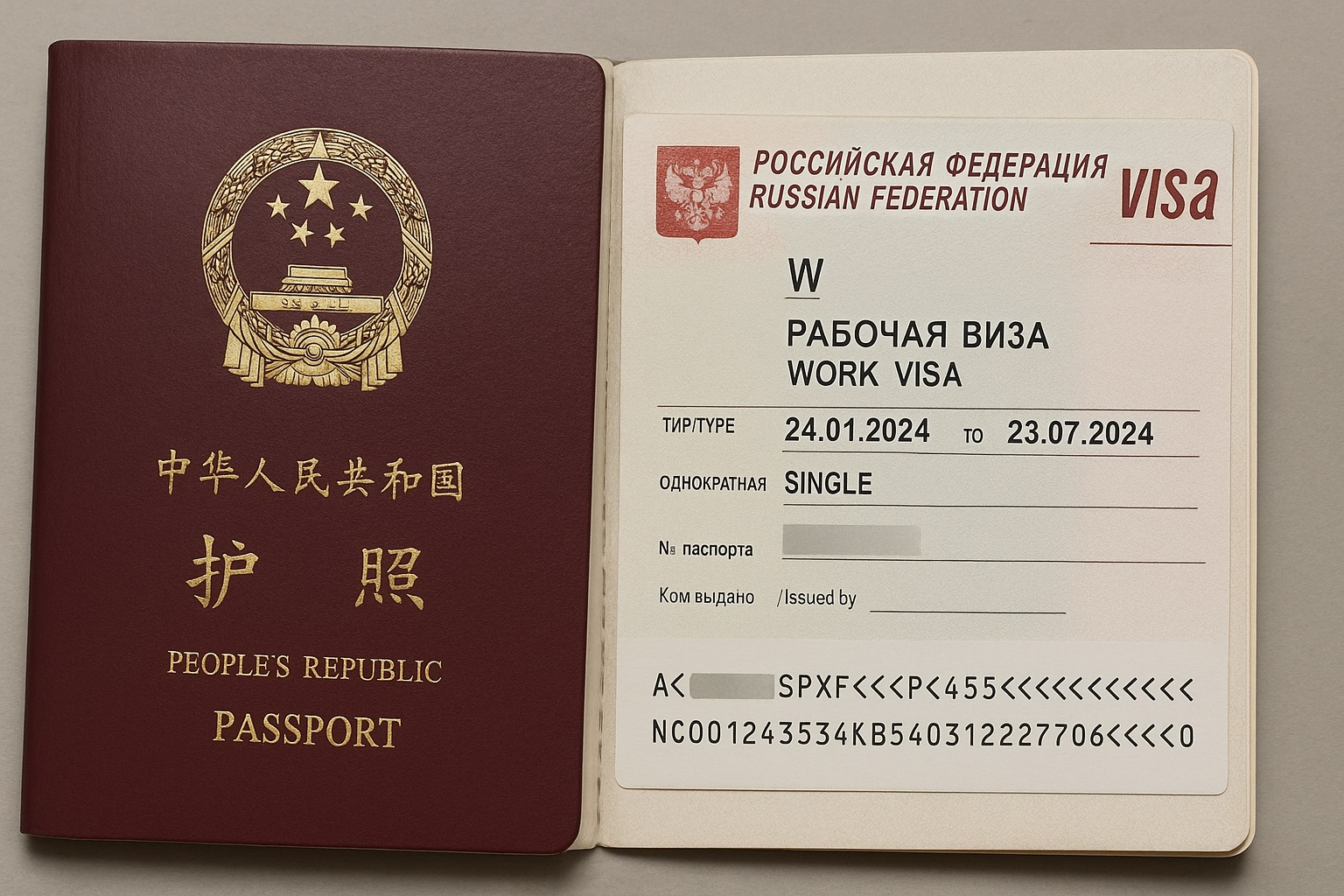Work Visa for Russia: Step-by-Step Guide and Current Updates
Planning to work in Russia? Then you need a work visa! This is a special document that allows foreign citizens to legally work in the country. Below is a detailed and easy-to-understand guide.

What is a Work Visa and Why is it Needed?
A work visa is an official permit for employment in Russia. Without it, a foreigner cannot legally work or receive a salary. It is mandatory for anyone planning to work for a Russian company.
Main Benefits of a Work Visa:
- Legal employment and salary in Russia
- Right to reside in Russia for 1–3 years
- Option to apply for family members’ visas
- No need to leave the country periodically
Types of Work Visas in 2025
Russia offers several types of work visas, each serving a specific purpose:
| Visa Type | Who It’s For | Key Features |
|---|---|---|
| Standard Workers | Any specialists | Requires quota or inclusion in approved professions list |
| HQS (Highly Qualified Specialists) | Salary from ₽250,000/month | Simplified process, 3-year visa |
| Family Members | Relatives of workers | Accompanying visa |
| Installation Work | Equipment specialists | 2025 Update: Renewal possible without leaving Russia |
Key Updates in 2025
Major Changes:
1. Reduced Stay Periods (Effective Jan 1, 2025)
- Visa-free citizens: 90 days per year instead of 90 days per half-year
- Does not apply to those holding work permits
2. Simplification for Installation Work (Effective July 20, 2025)
- Installation visas can be extended for 90 days without leaving Russia
- Previously, leaving the country was mandatory
3. New Rules for Compatriots (Effective July 20, 2025)
- Relocation program participants can get 1-year visas with extension options
Step-by-Step Guide to Obtaining a Work Visa
Step 1: Find a Russian Employer
You must have a Russian employer willing to hire you. Without an official job offer, you cannot apply for a work visa.
Step 2: Employer Prepares Documentation
The Russian company must obtain:
- Permit to Hire Foreign Workers
- Work Permit for the employee
- Official Work Invitation
Step 3: Prepare Required Documents
You will need:
- Valid passport (at least 18 months remaining)
- Completed visa application form from the MFA website
- Two 3.5×4.5 cm photos
- Employer’s invitation letter
- HIV-negative certificate (valid for 90 days)
- Medical insurance
- Consular fee payment receipt
Step 4: Submit Documents to the Consulate
Apply at the Russian consulate or visa center in your country. Processing usually takes 10–20 business days.
Step 5: Receive Visa and Enter Russia
After receiving the visa, you have 90 days to enter Russia.
Step 6: Register for Migration
Within 7 business days after arrival, you must register with migration authorities. This is done with your employer’s assistance.
Step 7: Extend Your Visa (if needed)
The initial 3-month visa can be extended up to 1 year without leaving Russia.
Special Rules for Highly Qualified Specialists (HQS)
HQS is a special category with simplified rules:
HQS Requirements:
- Minimum salary: ₽250,000/month (₽2 million/year)
- Higher education or specialized skills
- Professional experience in the relevant field

HQS Benefits:
- Simplified process — takes about 1.5 months
- Visa issued for 3 years with multiple entry
- Family visas available under simplified terms
- No quota required
Processing Time and Cost
Timeframes:
- Standard procedure: 2–4 months
- HQS: 1.5 months
- Consular processing: 10–20 days
Estimated Costs:
- Consular fee: varies by country
- Medical certificates: ₽3,000–₽5,000
- Document translations: ₽2,000–₽4,000
- Agency services: from ₽30,000
Common Mistakes and How to Avoid Them
Don’ts:
- Working without proper permits
- Missing application deadlines
- Submitting false or incomplete documents
- Working in a different region without authorization
Do’s:
- Monitor expiration dates
- Renew visas on time
- Report job changes promptly
- Follow migration regulations
Practical Tips
- Plan ahead — the process can take months
- Stay informed — regulations change regularly
- Consult specialists — migration law is complex
- Learn Russian — helps with integration
- Track legislative updates — many changes in 2025
Conclusion
Obtaining a work visa in Russia in 2025 involves both simplifications and new restrictions. The key is to follow instructions carefully, prepare documents correctly, and meet deadlines.
Remember: working legally in Russia protects both employees and employers.
Sources:
- Federal Law No. 114-FZ of Aug 15, 1996 “On Procedures for Entering and Leaving the Russian Federation”
- Border Service of FSB Information on Entry Procedures
- Visa Requirements for Foreign Citizens – Russian MFA
- Federal Law “On the Legal Status of Foreign Citizens in the Russian Federation” of July 25, 2002 No. 115-FZ